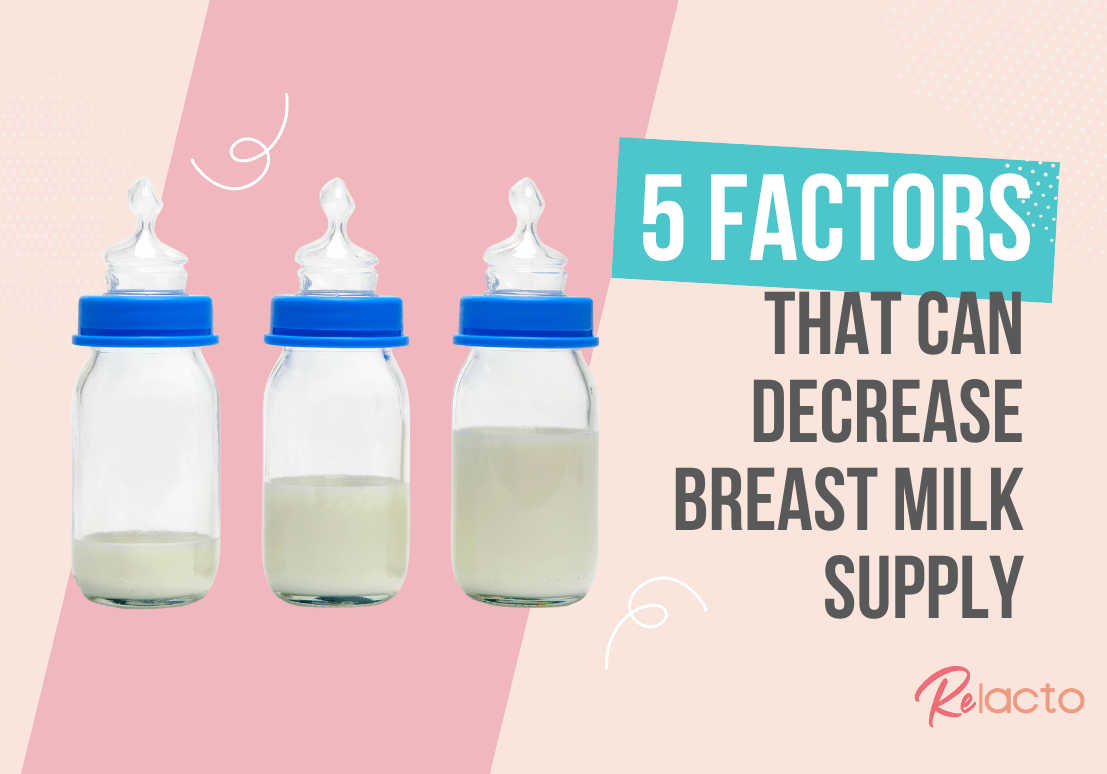5 Factors That Can Decrease Breast Milk Supply

Breast milk is often regarded as the optimal source of nutrition for newborns and infants. However, some breastfeeding mothers may encounter challenges when it comes to maintaining an adequate milk supply. Several factors can contribute to a decrease in breast milk production, which can be a source of concern for both mother and baby. Understanding these factors can help mothers take appropriate steps to address them and ensure a healthy milk supply. Here are five common factors that can lead to a decrease in breast milk supply.
Ineffective Breastfeeding Technique
One of the primary reasons for a decrease in milk supply is an ineffective breastfeeding technique. When the baby does not latch properly or is unable to extract milk efficiently, it can result in decreased milk production. A poor latch, nipple pain, or inadequate milk transfer may discourage frequent and effective nursing, leading to a decrease in milk supply over time. Seeking guidance from a lactation consultant or a healthcare professional can help address these issues and improve breastfeeding technique.
Infrequent or Inconsistent Nursing
Breast milk supply is largely driven by demand and supply. If the baby is not nursing frequently or is on an irregular feeding schedule, it can signal to the body that less milk is required. Skipping or delaying feedings can disrupt the natural supply and demand cycle and eventually lead to a decrease in milk production. Establishing a regular breastfeeding routine and ensuring the baby is nursing frequently, especially during the early weeks, can help maintain a healthy milk supply.
Insufficient Milk Removal
Incomplete milk removal during breastfeeding can signal to the body that less milk is needed. This can occur if the baby is not nursing long enough on each breast or if milk expression is inadequate during pumping sessions. It is crucial to allow the baby to nurse until they are satisfied and to empty the breasts effectively. If pumping, using the correct settings and ensuring proper breast shield fit can help optimise milk removal and maintain milk supply.
Hormonal Imbalances and Medical Conditions
Certain hormonal imbalances or medical conditions can affect milk supply. Conditions such as polycystic ovary syndrome (PCOS), thyroid disorders, diabetes, and hormonal birth control methods may impact milk production. It is important for mothers to consult with their healthcare provider if they suspect any underlying medical conditions that could be contributing to a decrease in milk supply. Proper diagnosis and treatment can help address these issues and support milk production.
Stress and Lack of Support
Stress and a lack of support can have a significant impact on milk supply. High levels of stress, anxiety, or fatigue can interfere with the let-down reflex and milk production. Additionally, a lack of emotional support, inadequate rest, and an overwhelming caregiving load can negatively affect breastfeeding. Creating a supportive environment, seeking help from loved ones, practising self-care, and managing stress levels can contribute to maintaining a healthy milk supply.

Best foods to increase breast milk
You may be wondering, what foods help produce breast milk? The best foods for lactation are surprisingly not that hard to obtain. They are not some magical ingredient that you need to break your back and sail the high seas for. In fact, among the best foods to increase breast milk are what you can find in your kitchen. Here are a couple of them.
Ginger
Ginger has long been celebrated for its medicinal properties, and its benefits extend to breastfeeding mothers as well. This root has blood-thinning properties that promote improved blood flow throughout the body, including the breasts. It is believed that by increasing blood supply and circulation, ginger can boost milk production, supporting a healthy breastfeeding journey.
Garlic
Despite its reputation for causing a strong odour, garlic can actually provide incredible benefits for nursing mothers and their babies. While it may be irritating if applied directly, consuming garlic may enhance breastfeeding. The aroma and taste of garlic in breast milk encourage babies to latch on for longer periods, leading to more effective feeding and an easier introduction to breastfeeding.
Fenugreek
Fenugreek has been long believed especially in traditional medicines in some cultures to improve breast milk supply. It has made many researchers around the world curious and intrigued by how such an ingredient used often in some cultures could potentially support milk supply in some mothers.They have found that although there is contradictory evidence of its impact, yet it is attributed to stimulation of sweat production. Since breast is a modified sweat glands, thus the effect of fenugreek on milk production may be possible.
Oatmeal
Oatmeal is a lactogenic food rich in fibre, complex carbohydrates, and iron, making it an excellent choice for breastfeeding mothers. Its high fibre content aids digestion, while complex carbohydrates provide sustained energy. Oatmeal is traditionally believed in some parts of the world to have milk-boosting properties, potentially increasing milk supply.
Now, if you are considering incorporating these ingredients and more to your diet as a breastfeeding mother, why not consider our dishes here at ReLacto? They are dietician-approved and are made by our expert chef to ensure deliciousness with the utmost lactation benefits. Come and try us out today!







